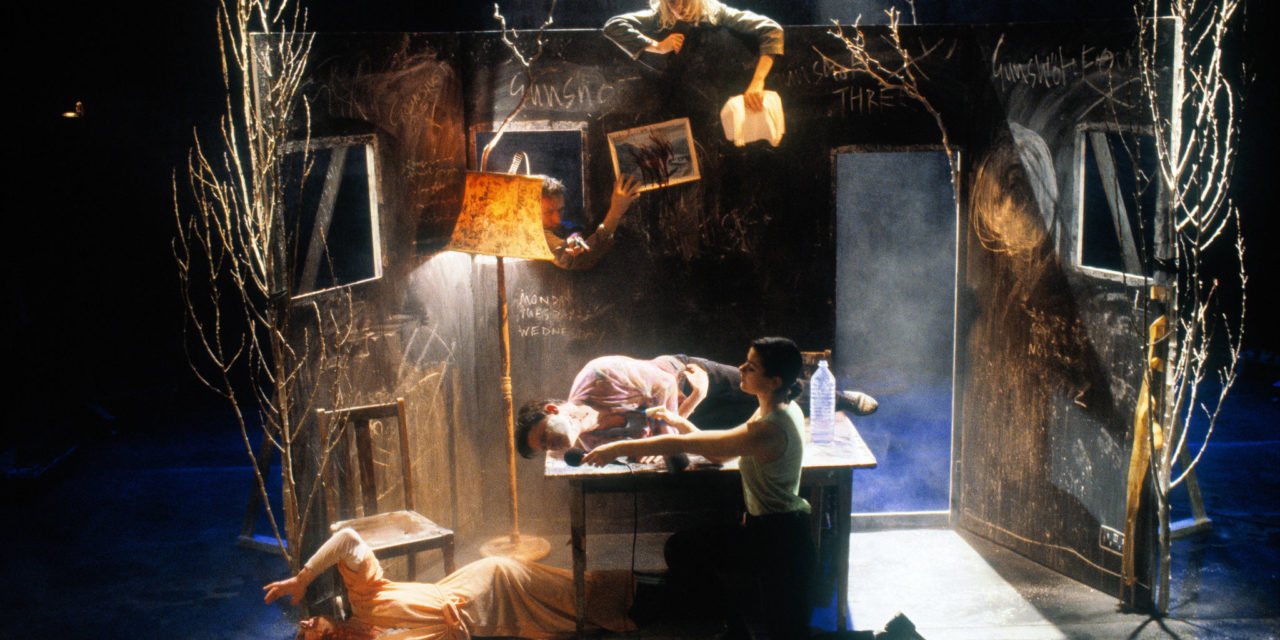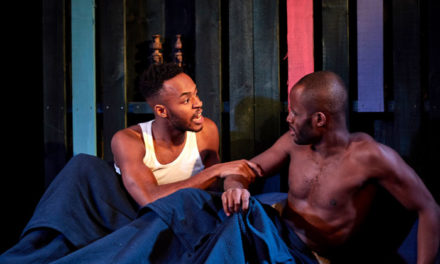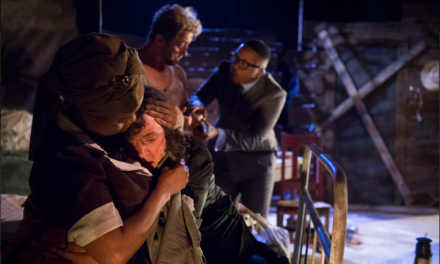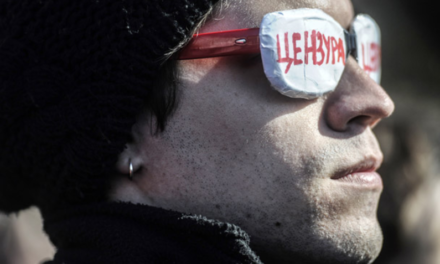In September 2016 the British experimental theatre company Forced Entertainment were the winners of the prestigious International Ibsen Award. Previous recipients of the award were Peter Brook (2008), Ariane Mnouchkine of Théâtre du Soleil (2009), Jon Fosse (2010), Heiner Goebbels (2012) and Peter Handke (2014). Adrian Heathfield was invited to give a laudation on the company’s work at the award ceremony at The National Theatre in Oslo. Here’s the transcript of that speech.
the thing between us
Laudations are rare in a Professor’s work life. Perhaps this is the only laudation I will ever give. We spend our work lives scrutinizing, diagnosing, dissecting, pulling apart words and acts, tarrying with the negative in order to better understand the object before us. Pleasure, praise, joy and celebration are too often strangers to this process. But today they are all joined with evaluation. I can warmly say, in affinity with the International Ibsen Award committee, that there is no other living artist or company that I would rather see honored, than Forced Entertainment. To give an account of their achievements is hard, not just because they are makers of that most elusive of art forms – the theatre – a “baseless fabric of visions” that “melts into thin air”. And not just because they have made a creative life through a kind of performance that draws attention to time’s passing; that works through paradoxical atmospheres of affective intensity, where words and deeds do not affirm each other, do not conform to rational explanation. It is difficult to give an account because what makes their work so singular and so exceptional are qualities found in a prodigious array of over sixty performance works sustained and distributed across over three decades of collective labor and seen in over forty countries across the globe. For contemporary theatre and performance artists, Forced Entertainment are a loadstar: a light so consistently bright in the constellation of contemporary cultural agents that every other maker must use them to locate themselves, to navigate their course through the turbulent seas of creative work.
Giving an account is also about calculation, about adding up, measuring gains and losses, summing what counts. And here Forced Entertainment’s long collaborative engagement is another incalculable scene. Countless minutes, hours, days, months, spent being and making with others: watching, doing and performing. Testing, testing out: limits, propositions, bodies, and worlds. It is easy to forget, because they have made it seem so right, so honorable, so appealing, how hard this long experimental toil of collective affinity is; how counter to a culture obsessed with the individual, with authority and authorship, with ownership, with surfaces and fast delivery, with the immediately visible and legible.
At the age of eighteen, thirty years ago, when I first saw their early work (Let the Water Run its Course) to the Sea that Made the Promise, I sat frozen in the theatre as the audience filed out, unable to leave my seat. Speechless too, but knowing I had just witnessed something that took apart all the lazy assurances of contemporary theatrical work and replaced them with forms derived from necessity and urgency. Raw, desirous, real people there: bodies striving, without reason or goal in a bare world made by luminous broken poetry. A dystopia that felt like the inner-world of that present time. A theatre, finally, that spoke with the time: a time of longing for another world of possibility and love beyond the impoverished, dysfunctional and violent realities of those mid-1980s days. A warmongering surveillance state was brutalizing internal ‘enemies’, laying waste to countless lives; rampant corporations were spawning greed and vast inequality, and the government was selling off the welfare state. All was accounting: for those who counted and those who simply didn’t count. Forced Entertainment’s theatre was born in this context and its counter-culture. History hasn’t stopped repeating itself. Amidst this latest wave of corporate ideology mediated through control society, isolationism, intolerance and fear, Forced Entertainment continues to remind us of other kinds of value in life. Values that come not from the willful, robust all consuming and defensive self, but from the experience of subjection and dispossession, from alienation and non-belonging, from the precarious community of those who have nothing in common.
As a too frequent audience member, at some point in those thirty years, I got invited to come and see an early run-through of a show, and another world of Forced Entertainment opened up. It’s hard for occasional visitors, outsiders like myself, to really get what’s going on with them, so long is the process, so particular their language, so obscure the way it moves in fits and starts, rewinds and fast forwards, in endless versions and revisions of morphing worlds. And at some stage later, I realized that this was the point: the work comes from the collective unconscious of a constantly shifting, opening social organism. Perhaps the last vestiges of that old, old micro-society, or queer family: the theatre troupe, the traveling band. So if I had to count the years, to say what really counts over thirty years, it would be this: to have endured in this space of invention together. With all its difficulties, ruptures and re-gatherings. A way to be an artist in the world: on the long haul flight of a slow collective experiment in attentiveness to the emergent thing between us.
So I simply want to say thank you Forced Entertainment.
For the delicate melancholy, and the twisted emotions, the raging explosions, and the shabby razzmatazz. Thank you for the pathos and the bathos, the gritted smiles and the rambling on, and the soft low questions. Thank you for the bitter vitriol, the sentimental overloads, the spurious and the scurrilous propositions, the whimsical afterthoughts, and the preposterous truths.
Thank you for the sense of the sublime within the mundane, for presenting the unpresentable. For having nothing left to show, nothing left to say, nothing left to do, and yet still carrying on.
Thank you for the stupid, hopeless, lost, hiding, clumsy, desperate, vague, talentless, misguided, careless, dirty, silly people who nonetheless try to be with us here tonight, try to be something, try to make it work, try to connect, try to love, try to make a show.
Thank you for the repeated interruptions, the unfinished trains of thought, the intolerable fact of others. Thanks for composite worlds made out of cutting something against something else. And thank you for a silence that can never happen, a despair without end, and for all the glimpses of the void.
Thank you for the obscenities, for the sustained un-erotic acts, and for saying the unsayable and saying it again, and then saying it some more. And for the laughs, thank you especially for the laughs: the sniggers, the aching heavy ones and the sudden guffaws, the quiet interior chuckles, and the rolls of hysteria.
Thank you for the failures, everyone: the human falls, the stumbling into silence, the failed attempts, the impossible desires, the faltering voices and flailing limbs, the useless acts and images, the redundant propositions and tired old tails, the fading light.
And thank you for all the lists, the proliferations and flowerings, elaborations, and echoes, the same again but different once more, the fabrications and the fabulations, the utopias and dystopias.
Thank you for going on too long, for staying up all night, for seeing what comes from utter exhaustion, the endless questions and the story without end. And thank you for the ineffable feeling of ending before it really is the end, the many, many ends.
Thank you, Cathy, Richard, Claire, Robin, Terry, Tim for all those unnamable experiences and inexplicable atmospheres. Thank you for the dark heart of things, for the joy in the catastrophe. And thank you for a lame theatrical prop cloud silently drifting across a sundered world. I could look at that cloud for thirty years. For these things amongst a thousand other tiny shards of memory, sparks of life, of passion, spirit and love, thank you.
This post was written by the author in their personal capacity.The opinions expressed in this article are the author’s own and do not reflect the view of The Theatre Times, their staff or collaborators.
This post was written by Adrian Heathfield.
The views expressed here belong to the author and do not necessarily reflect our views and opinions.


















